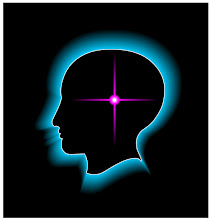Sunday, June 7, 2009
Setting an Ideal and Meditation
According to Edgar Cayce's discourses, the most important meditative technique we can do is to first set an ideal. He wants this ideal to be a mindful understanding, even written down. He says, "Know in whom and in what you believe. Know what is the ideal you, as well as the ideal life, attitude, emotional dynamic, and activity. Why do we need to do this? Because the practice of meditation gives life and strength to our ideals - whatever ideals we hold. Cayce said that we can build a frankenstein or a godling of the great God using the same techniques - the ideal held while building this being will determine what the outcome will be. Thus, we need to spend a little time reflecting on our ideals, shaping them in a manner that we feel good about, because they are going to gain strength over the course of our meditation practice - whether we are conscious or unconscious of this. Cayce said that we will gradually be raised to the level of our highest ideal. He encouraged us to set a high, spiritual ideal, one that included the Fruits of the Spirit: love, kindness, gentleness, patience, long-suffering, humility, meekness, and so on. He encouraged us to think of ourselves as channels of God's love and light in this world, and to leave the world a better place for us having lived in it. Our meditation practice will build on these, and we will become what we hold as ideal. Meditation is creation. Let's be mindful of what we are creating. Set an ideal and hold that in heart and mind, both during our meditation and our daily life.
Subscribe to:
Post Comments (Atom)


Your blog is happy news, John. I have questions about meditation but will start with one about ideals since it came up in study group last week.
ReplyDeleteWe're reading an ARE book, but not SFG. Some people found an example from the readings
where a man kept vacillating between 2 wives over a period of years somewhat humorous. One
person strongly objected to the chuckles and felt that the chucklers were being judgmental & not sticking to their ideals. The humor was not mean-spirited & one person even spoke about being able to identify with the man’s romantic indecision. In thinking about this, I sensed a tension between holding one’s ideals and seeking to evaluate behaviors in others. Any thoughts on this?
On a more general note, I've long felt that, at least for me, the highest ideal comes from the heart of the Lord's Prayer--Thy will be done. I affirm it in meditation and throughout the day.
Thanks,
AnnJ
Yes, "Thy will be done" is a high ideal. I would add that ultimately we are to be (and once were) co-creators with the Creator, so He/She wants us to use our wills too. Cayce's readings encourage us to engage the greatest gift we were given: free will. He would say that engaging one's will in making a decision was one of the most important aspects of Earth life. Even if our decision was wrong, we would learn from it and grow wiser. "Do something, right or wrong, do something. In the doing comes the understanding." I've written a post on Ideals, so look at the older postings and you'll find it. Yes, I also agree with you that there is always a tension between one's ideals and evaluating someone's behavior. I try to keep from letting my evaluation become a condemnation or heavy judgment on the other person, rather simply an observation of human nature that we all are susceptible to. I too can understand the man's romantic indecision. I didn't get married until I was 33! But fortunately it is a good marriage, celebrating 30 years this past May. My folks, who are in their 90s and have been married 64 years!
ReplyDeleteThanks, John. What a blessed family.
ReplyDeleteI think that in affirming God's will, I am also using my will in choosing to attune to His. This is a process. In the mean time, life forces us to make many decisions every day. So while I affirm His, I must act and make the best choices I know how to make. And I think my choices are improving!
When Cacye was asked about a definition of Christ consciousness, He approved the definition as a "pattern imprinted on the mind waiting to be awakened by the will." Awakened by our will not God's.
ReplyDeleteLet me correct that quote. I can't seem to edit the previous comment. The question to Cayce was "Should the Christ-Consciousness be described as the awareness within each soul, imprinted in pattern on the mind and waiting to be awakened by the will?" His response was "That's it exactly."
ReplyDeleteThank you for the answer about Christ-consciousness.
ReplyDeleteIsn`t it therefore prayer and especially meditation will be of importance to practize on a regular basis? Because it is only then we are able to awaken the Christ Consciousness through the spiritual centers within us?
I have newly read the two volumes by Paramhansa Yogananda: " The Second Coming of Christ." Besides reading the one book by Richard Henry Drummond: " A Life of Jesus the Christ: From Cosmic Origins to the Second Coming."
I`m also with a ISFG-Study Group on the net as well.
....and thank you very much of given the opportunity to be in touch with you and each others in this forum.